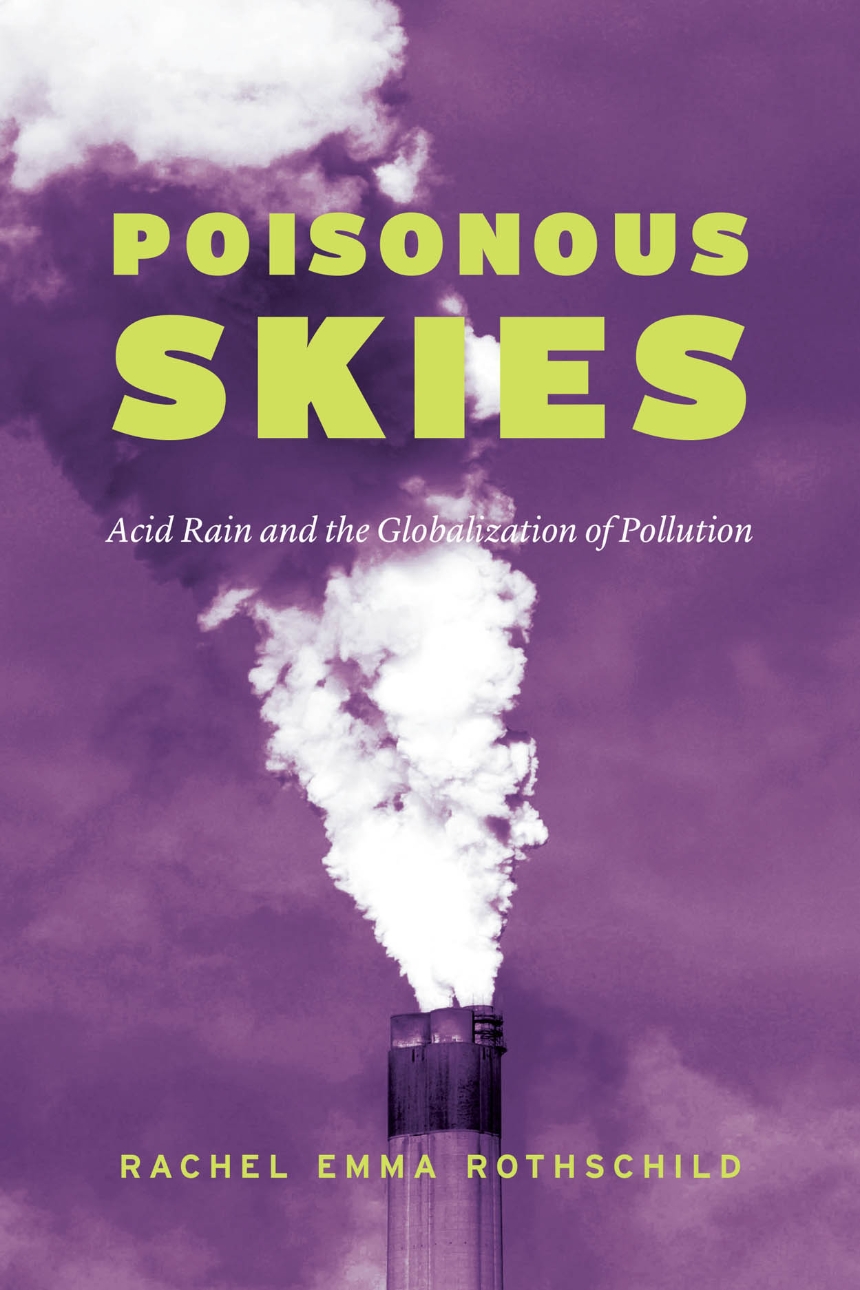Poisonous Skies
Acid Rain and the Globalization of Pollution
The climate change reckoning looms. As scientists try to discern what the Earth’s changing weather patterns mean for our future, Rachel Rothschild seeks to understand the current scientific and political debates surrounding the environment through the history of another global environmental threat: acid rain.
The identification of acid rain in the 1960s changed scientific and popular understanding of fossil fuel pollution’s potential to cause regional—and even global—environmental harms. It showed scientists that the problem of fossil fuel pollution was one that crossed borders—it could travel across vast stretches of the earth’s atmosphere to impact ecosystems around the world. This unprecedented transnational reach prompted governments, for the first time, to confront the need to cooperate on pollution policies, transforming environmental science and diplomacy. Studies of acid rain and other pollutants brought about a reimagining of how to investigate the natural world as a complete entity, and the responses of policy makers, scientists, and the public set the stage for how societies have approached other prominent environmental dangers on a global scale, most notably climate change.
Grounded in archival research spanning eight countries and five languages, as well as interviews with leading scientists from both government and industry, Poisonous Skies is the first book to examine the history of acid rain in an international context. By delving deep into our environmental past, Rothschild hopes to inform its future, showing us how much is at stake for the natural world as well as what we risk—and have already risked—by not acting.
The identification of acid rain in the 1960s changed scientific and popular understanding of fossil fuel pollution’s potential to cause regional—and even global—environmental harms. It showed scientists that the problem of fossil fuel pollution was one that crossed borders—it could travel across vast stretches of the earth’s atmosphere to impact ecosystems around the world. This unprecedented transnational reach prompted governments, for the first time, to confront the need to cooperate on pollution policies, transforming environmental science and diplomacy. Studies of acid rain and other pollutants brought about a reimagining of how to investigate the natural world as a complete entity, and the responses of policy makers, scientists, and the public set the stage for how societies have approached other prominent environmental dangers on a global scale, most notably climate change.
Grounded in archival research spanning eight countries and five languages, as well as interviews with leading scientists from both government and industry, Poisonous Skies is the first book to examine the history of acid rain in an international context. By delving deep into our environmental past, Rothschild hopes to inform its future, showing us how much is at stake for the natural world as well as what we risk—and have already risked—by not acting.
See the online bibliography for the book.
336 pages | 14 halftones | 6 x 9 | © 2019
History: Environmental History
Political Science: Diplomacy, Foreign Policy, and International Relations
Reviews
Table of Contents
List of Acronyms
Introduction: A Rain of Ashes
1: Creating a Global Pollution Problem
Death-Dealing Fogs
From the Local to the Global
The Discovery of Acid Rain
2: The Science of Acid Rain
Acid Rain and the Development of Environmental Science
Crossing Boundaries: Constructing a Science of Acid Rain
The End of the “Heroic” Era
3: Energy Industry Research and the Politics of Doubt
Divesting from Pollution Control Technology
The Energy Industry Enters the Environmental Science Field
A “Silent Spring” for Acid Rain?
4: Pollution across the Iron Curtain
Overtures to Eastern Europe
Environmental Monitoring and the Limits of Détente
Pollution Modeling without Target Maps
5: Environmental Diplomacy in the Cold War
Economic or Environmental Catastrophe
Scientists as Diplomats
Thwarting a Convention with Teeth
6: An Environmental Crisis Collides with a Conservative Revolution
Ecology and the Question of Environmental Damage
Confronting Coal Industry Influence under Reagan and Thatcher
International Pressure Meets Domestic Politics
7: Acid Rain and the Precautionary Principle
Costs and Benefits of Precaution
A Scientific “Bribe”
Britain Joins the Acid Rain Club
8: A Warning Bell for a Fossil Fuel Future
The Last Holdout
A Pyrrhic Victory for Scientific Expertise
The Environmental Legacy of Acid Rain
Epilogue: The Climate Change Reckoning
Acknowledgments
Notes
Sources
Archival Sources
Oral Histories
Published Sources
Index
Introduction: A Rain of Ashes
1: Creating a Global Pollution Problem
Death-Dealing Fogs
From the Local to the Global
The Discovery of Acid Rain
2: The Science of Acid Rain
Acid Rain and the Development of Environmental Science
Crossing Boundaries: Constructing a Science of Acid Rain
The End of the “Heroic” Era
3: Energy Industry Research and the Politics of Doubt
Divesting from Pollution Control Technology
The Energy Industry Enters the Environmental Science Field
A “Silent Spring” for Acid Rain?
4: Pollution across the Iron Curtain
Overtures to Eastern Europe
Environmental Monitoring and the Limits of Détente
Pollution Modeling without Target Maps
5: Environmental Diplomacy in the Cold War
Economic or Environmental Catastrophe
Scientists as Diplomats
Thwarting a Convention with Teeth
6: An Environmental Crisis Collides with a Conservative Revolution
Ecology and the Question of Environmental Damage
Confronting Coal Industry Influence under Reagan and Thatcher
International Pressure Meets Domestic Politics
7: Acid Rain and the Precautionary Principle
Costs and Benefits of Precaution
A Scientific “Bribe”
Britain Joins the Acid Rain Club
8: A Warning Bell for a Fossil Fuel Future
The Last Holdout
A Pyrrhic Victory for Scientific Expertise
The Environmental Legacy of Acid Rain
Epilogue: The Climate Change Reckoning
Acknowledgments
Notes
Sources
Archival Sources
Oral Histories
Published Sources
Index
